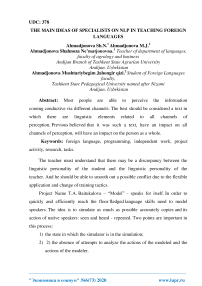The main ideas of specialists on NLP in teaching foreign languages
Автор: Ahmadjonova Sh.N., Ahmadjonova M.J.
Журнал: Экономика и социум @ekonomika-socium
Рубрика: Основной раздел
Статья в выпуске: 6-1 (73), 2020 года.
Бесплатный доступ
Most people are able to perceive the information coming conductive via different channels. The best should be considered a text in which there are linguistic elements related to all channels of perception. Previous believed that it was such a text, have an impact on all channels of perception, will have an impact on the person as a whole.
Foreign language, programming, independent work, project activity, research, tasks
Короткий адрес: https://sciup.org/140252407
IDR: 140252407 | УДК: 378
Текст научной статьи The main ideas of specialists on NLP in teaching foreign languages
The teacher must understand that there may be a discrepancy between the linguistic personality of the student and the linguistic personality of the teacher. And he should be able to smooth out a possible conflict due to the flexible application and change of training tactics.
Project Name T.A. Baitukalova – “Model” - speaks for itself. In order to quickly and efficiently reach the floor fledged language skills need to model speakers. The idea is to simulate as much as possible accurately copies and its action of native speakers: seen and heard - repeated. Two points are important in this process:
-
1) the state in which the simulator is in the simulation;
-
2) 2) the absence of attempts to analyze the actions of the modeled and the
actions of the modeler.
In the understanding of DB Nikulicheva NLP - a constructive psychology of the resource, which is the basis of the expert modeling. Expert modeling is one of the key points of NLP.
E.A. Umin said that the main drawback of many used to study a foreign language methods is as follows: the IU Toda are based on conscious memorizing rules of grammatical structure tour and the words of a foreign language without the prior formation of SLE and motor memory trace - engrams, providing automatical perception and production (speaking) in a foreign language. As well as A.A. Pligin E.A. Umino said that we should not be afraid of that relate to their own mistakes must be so: if you de barks error - neutral emotions, if you are right - positive emotions.
In terms of analyzing the use of NLP - the technician in training strange language interesting article V.P. Belyanin “Neuro Linguistic Programming and teaching of foreign languages”. The article gives an idea of the common views of Neuro Linguistic Programming and made interesting findings from wearing the possible use of these views in the practice of teaching a foreign language. Interesting ideas are expressed that students differ in strategies for learning material. Like previous authors, V.P. Belyanin believes that the educational process must be built multi-sensor, using all the modalities.
Constructive Psychology Resource is aimed at people to learn to explore their own sensory experience successfully of behavior. This experience is for each person, and it is connected with his states success, which means that high resource.
Learn how to add to the experience of the expert behavior of other people, anyone is able to simulate the most efficient behavior in different life situations, or replace their previous ineffective behavioral strategies to more effectiveness.
With regard to learning foreign languages can also certain stereotypes that then unconsciously reproduced again and again as some “mental programs”, while leading to unsuccessful results. D.B. Nikulicheva teaches how by just personal exercise to remove the typical psychological, language barriers and complexes, to develop a profoundly positive attitude to learning language of the country logical characteristics of a specific person.
Thus, we can say that there are several NLP new ideas that seem to be very useful for improving the quality of students' knowledge, as well as to optimize the relationship between teachers and students. It:
-
• the use of affective, social, cognitive strategies for learning a foreign language;
-
• recognition of the student’s cognitive style and the use of methods that are most suitable for the student or for this group of students;
-
• identification of students with a penchant for different methods of language acquisition;
-
• taking into account the characteristics of each student (modality and the leading hemisphere);
-
• impact on all channels of perception and processing of information, the implementation of multi training for presentation of informations in all three modalities;
-
• offering students different - for each type of student their own tasks that are suitable for each individual student type (visuals, audial, digital);
-
• elimination of the conflict between the teacher’s teaching style and the student’s teaching style;
-
• increasing the independence of the student in the process of mastering a foreign language through the use of NLP techniques.
Priority pedagogical goals of the individual approach to each student, create individual strategies based on the personal identity of each student.
"Экономика и социум" №6(73) 2020
Список литературы The main ideas of specialists on NLP in teaching foreign languages
- Umin E. A. Foreign - easy and with pleasure. - M.: Scarab, 1993.
- N.A. Odilova., M.U. Irgashev. Information and communication technology in language learning. International conference., 2016
- Belyanin V.P. Neuro-linguistic programming and teaching foreign languages.
- Baitukalov T. A. Learning a foreign language from the point of view of NLP modeling.


